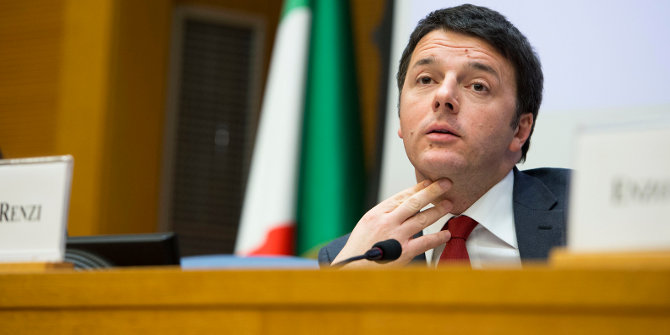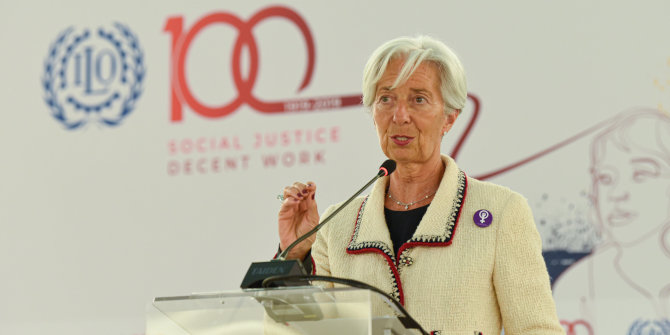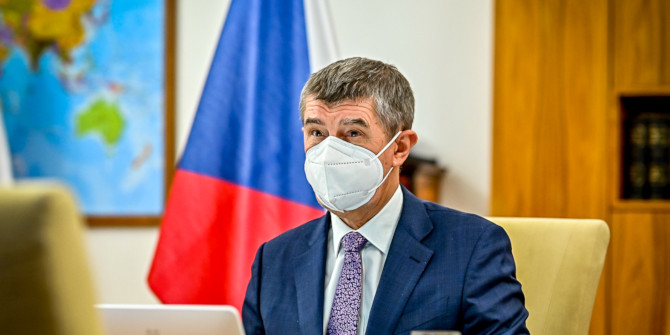Macedonia’s opposition leader, Zoran Zaev, was among a number of people injured after protesters stormed the country’s parliament building on 27 April and attacked MPs. Misha Popovikj argues that the violence, which emerged after Zaev attempted to form a new coalition that would have excluded the incumbent VMRO-DPMNE party, should be the final straw for the international community and must lead to firmer action from the EU in ensuring a legitimate democratic transition of power.
On 27 April, shortly before 7pm, an angry mob entered the Macedonian parliament and attacked MPs from the Social Democratic Union (SDSM), the Democratic Union for Integration (DUI) and the Alliance of Albanians (AA). The attacked MPs included the leader of the SDSM, Zoran Zaev, Ziadin Sela from the AA, and many others. Although there were no fatalities, images show significant injuries. There are reports of attacks on journalists as well, with around 100 people said to have been attacked overall.
The attack came as a reaction to the controversial election of the Speaker of the Macedonian Parliament, Talat Xhaferi, who is a member of the largest ethnic Albanian party, the DUI. According to the group behind the attack, this election did not follow the Rules of Procedure of the Parliament and was in essence a coup against the Macedonian state. The group was a part of the civic movement ‘Za zaednichka Makedonija’ (For Mutual Macedonia) which had vowed to protect the Assembly from potential usurpers and had previously protested against the platforms of Albanian parties. Their position, which is in line with that of the largest party in parliament, VMRO-DPMNE, is that these parties are acting against the Constitution by seeking to change national names and symbols while promoting the official use of the Albanian language – steps, according to them, that would lead to federalisation.
This situation came after the continuation of a political crisis that was supposed to end with early parliamentary elections in December 2016. However, the country’s President, Gjorge Ivanov, did not hand over a mandate to Zaev and the SDSM after the incumbent VMRO-DPMNE, which is led by Nikola Gruevski, failed to gather majority support. Although Zaev had assembled a majority with other parties, President Ivanov refused to give the mandate claiming that his coalition partners (the Albanian bloc and their platform) represented undue foreign influence and was therefore against the national interest.
The SDSM then went back to parliament on 27 March in an attempt to elect a President of the Assembly who, in line with the Constitution, could then send a note to the President to inform him of the majority, thus exerting more institutional pressure for a mandate. However, this parliamentary session was filibustered by VMRO-DPMNE, effectively halting the establishment of the parliament. The SDSM and their coalition then decided to ignore the session due for 27 April and moved to elect the new Speaker, citing parts of the Rules of Procedure that supposedly enable them to do so.
Although filibustering – obstructing legislative processes by discussing issues for so long that a vote cannot be held – has historically been seen as a legitimate measure to be used against the ‘tyranny of the majority’, this filibuster was about preventing a transfer of power. A ‘proper’ filibuster would be aimed against actions such as laws and resolutions that seek to make unconstitutional reforms, but this was not the case on this occasion. Some lawyers argued that although the move from the SDSM did not literally follow all aspects of the Rules of Procedure, the fact that the ultimate goal was to secure a transfer of power bridged all legal loopholes.
But the violence that erupted on 27 April demonstrated the inevitable, which is that if there is no democratic regime, then one cannot expect a peaceful transfer of power. Macedonia has been falling in democratic rankings, with the Nations in Transit index currently identifying it as a ‘hybrid regime.’ The European Commission in their Country Report in 2016 also indicated that ‘state capture’ has been hindering democratic development.
The best example of this is the capture of the police, who failed to protect MPs, permitting the mob to enter the Assembly. Some of the police members reportedly sang along with the protesters, while attackers with masks were seen ordering the policemen what to do and not do. Speculation is rife that some of the attackers may even have been policemen themselves. The head of the Bureau of Public Safety ordered police intervention two and a half hours after the initial breach and no one down the command ladder (at least three more in the chain of command) dared to take the initiative and protect the Assembly. The way the events unfolded therefore came as little surprise to observers.
Immediate future developments are uncertain. Escalation is probable as any newly elected government will not be recognized by VMRO-DPMNE and their supporters on the streets. President Ivanov called the country’s political leaders to a meeting to resolve the situation, however he failed to condemn the violence and implied that all parties must accept the consequences of their actions. It is unlikely that the attacked political parties will participate in any negotiations.
The international community has so far produced a mixed reaction. As far as the EU is concerned, Federica Mogherini and Johannes Hahn recognised the newly elected Speaker, which eases the burden of the new parliamentary majority and puts pressure on VMRO-DPMNE. The US Embassy in Skopje and NATO followed this line.
The next few days will be key in resolving the crisis. The international community will be obliged to take a side as their indecisiveness in previous years has left too much space for political actors that are unwilling to participate in the process democratically. The recognition of Talat Xhaferi as Speaker is certainly the first step. But they must face the fact that the leadership of VMRO-DPMNE does not have an interest in being removed from power. The successful resolution of the crisis also likely means that some of their leadership will be convicted for abuse of office and corruption. Therefore, as a start, the international community will have to accept that this situation will not be resolved with another agreement and protracted negotiations, since at least one party in the negotiations will not be capable of upholding its promises.
And once a new government is elected, the EU would be wise to prevent delays in negotiations for EU membership. EU member countries must persuade Greece not to block this process as the EU accession process is one of the key issues that can bring together what is now a highly polarised society. It will also provide breathing space for a new government faced with tough decisions on much-needed reforms.
Please read our comments policy before commenting.
Note: This article gives the views of the author, and not the position of EUROPP – European Politics and Policy, nor of the London School of Economics.
_________________________________
 Misha Popovikj
Misha Popovikj
Misha Popovikj is a researcher at the Institute for Democracy ‘Societas Civilis’ Skopje. He is a UCL/SSEES alumnus.





